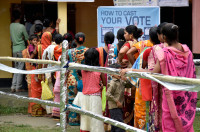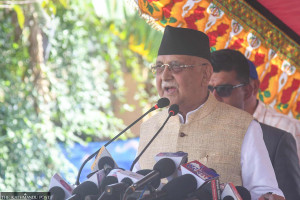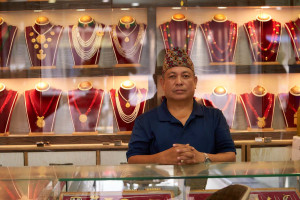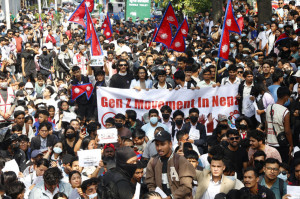Opinion
Diverging on Dashain
The practice of first celebrating Dashain with the husband’s family reflects existing gender inequalities
Pramila Rai
Dashain is here and most are busy planning celebrations for this time of family and food, as this is the grandest festival of Hindus, who constitute the bulk of Nepalis. But a colleague of mine shared that she is scared of Dashain and similar festivals. She is an educated, empowered woman who works for a reputed company in a respectful position. She is independent, has been married for almost five years, and supports her family. She does not live with her in-laws at the moment because of her and her husband’s jobs, but she has been celebrating Dashain with her in-laws ever since she got married. Her grouse, therefore, has to do with the fact that she is not expected to spend Dashain with her own family but with her in-laws.
This scenario clearly depicts the state of our society and culture. Nepal is still a patrilineal and patrilocal country. However, current Nepali society is in transition, where the constitution and policies advocate for equal rights to every citizen, regardless of ethnicity, caste, class, or gender. All are supposed to be provided with opportunities under a just and uniform policy, so that every citizen becomes empowered and can make choices for oneself. But the little progress made in this area shows that reducing gender disparity is extremely tough as it challenges our current social structures, power relationships, and threatens the ruling class. Moreover, it requires compromises from the privileged side.
Husbands first
The above example also indicates the status of females in this part of the world. My friend related how her parents and relatives cried during her wedding. But why did they do that? She was just starting her conjugal life and everybody should have been happy for that leap she made. But the bitter fact of leaving your parents and going to live with in-laws is enough to scare every female. Men do not have to suffer this adventurous and emotional transition. The morning after the wedding, the groom will be with his parents in a cozy and familiar home, but the woman has to adjust to a strange and completely new environment.
Coming back to Dashain, a year ahead of her marriage, my friend got tika and blessings from her parents and her siblings, but after marriage, she had no such opportunity. This is standard, even though some women don’t feel comfortable with this conventional practice. The persistence of these conventional rituals that place the husband and the husband’s family before the wife and her family is disappointing and demands change, along with a change in other socio-political issues. Why cannot the woman and her husband celebrate Dashain with her family if they so desire? If not always then at least alternately. What if a couple has only female children? Women too want to spend time with their family, but society prescribes that they put their husbands before their own desires. The men, on the other hand, are under no obligation to put their wives and wives’ families first.
Many women compromise with this situation and find ways to enjoy life as it is, but others remain conflicted with themselves, especially modern women who have been raised to claim equal rights, regardless of gender. After marriage, they too encounter gendered roles that they are supposed to fit into and additional responsibilities that only wives must undertake. Such traditions have perpetuated the grip of gender inequality. Such conditions manifest in a marked preference for a son and if taken to an extreme, can result in untoward effects like sex selective abortion, as is the case in many South Asian countries, especially India.
Start with the home
But it is also true that there have been significant improvements in the school enrollment of women. After the political change of 2006, women have also been given special privileges by reserving quotas for education and employment, but there hasn’t yet been a corresponding congruent shift in the cultural discrepancy. The image of female children as being inferior and dependent is still prevalent in societal perception. A rise in education levels, a broader horizon of thinking, and economic autonomy have led many females to question their own existence. This is, in fact, a good step towards individual freedom and proper self esteem. But at the same time, it also leads to mental stress, anxiety, denial, and strains within the family.
This country, being a patriarchal society, we have seen many leaders who rebelled against the dictatorship of the Rana dynasty and who revolted against the absolute monarchy of Gyanendra Shah. We have fought to establish a righteous constitution and a democratic practice. We recently also fought to make this country a federal democratic republic. However, we are overlooking the problems inside our home and we have let the gender inequality take root. No one will come to fight for your home affairs, as you sometimes become a victim and sometimes a perpetrator. You are witness and judge to your own affairs. We must work to modify the customs and cultures that treat different genders unfairly, perhaps starting with this Dashain.
Rai is a senior instructor at the School Of Public Health and Community Medicine, BP Koirala Institute of Health Sciences, Dharan




 27.12°C Kathmandu
27.12°C Kathmandu










